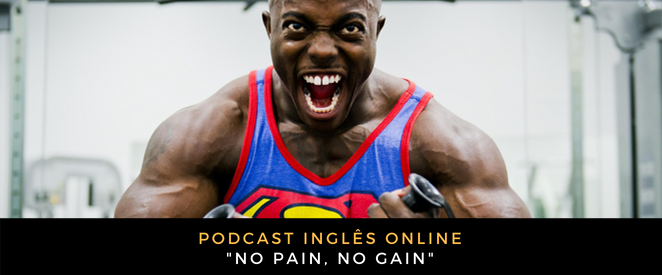Podcast: No pain, no gain
By Ana | Podcast Inglês Online

Podcast: Download
Assine: RSS
What’s up? No episódio de hoje, falo sobre dois provérbios pra lá de comuns na língua inglesa. Não perca!
What’s up? This is the new episode of the Inglês Online podcast.
Please subscribe to this podcast using the Podcasts app for iPhone or iPad, or listen to the episodes using the Inglesonline Android app.
Thanks for all the comments at the iTunes store and if you haven’t yet left a comment for this podcast please do so: the more comments for the Inglês Online podcast, the more people will find out about it and listen to the episodes.
Thank you for telling your friends, your neighbours, your family and keep listening.
So let’s focus today on a couple of proverbs in English. Proverbs are sayings that have stood the test of time. In other words, they supposedly reflect some kind of truth and therefore people continue to say them because… truth never changes.
I’ve talked about proverbs before in our podcasts and I’ve probably already asked the same question I’m gonna ask now: are proverbs always the truth? Well, I happen to disagree with some proverbs, to be honest. So, in my opinion, no, they’re not always the truth.
Wanna hear an example? No pain, no gain. Ok, that’s probably not a proverb per se, but boy is that a popular saying. I think almost every gym in the UK has that saying glued to a wall. OK, when it comes to exercising and training that might be true – no pain, no gain.
If you want to be in great physical shape or become a good athlete, then you’ve got to train, exercise, work out, lift weights, all of that stuff. There’s a bit of pain involved, that’s true. So in order to have some gain – in other words, in order to achieve your goal – you do have to experience some pain. True.
If you want to become really good at something – let’s say, speaking English, you do have to put in time and effort. Unless you’re a baby learning to speak, of course. So – if putting in time and effort equals pain, then there you go: no pain, no gain.
Now, the reason I slightly disagree with this saying is that pain is sometimes relative. Some people really enjoy training and working out and honestly don’t mind doing it. Other people do not mind studying at all – I know people who love to study! So in their case – no pain and a lot of gain.
Also – how about winning the lottery? That’s like zero pain and a big gain. What do you think?
Alright – so let’s move on to our second proverb: Great minds think alike. First of all, ‘think alike’ means ‘think in the same way’. You know when you and your friend say almost the same thing at the same time? That means you guys were thinking the same thing. The two of you think alike. One of you might say “Great minds think alike”.
Of course, it’s always a bit of a joke when someone says that… It’s like, they’re congratulating you for being as smart as they are. After all, you said the same thing they said. One other example for this is, you could be chatting with someone on Facebook and you and your friend post the same thing simultaneously. So you type in next “Great minds think alike”.
Do you have a close friend or a relative, with whom that happens a lot? Please let me know in the comments… And talk to you next time!
Key terms
Vocabulário
have stood the test of time = já duram muito tempo
per se = por si só, em si mesmo
boy is that a popular saying = puxa, como esse ditado é comum